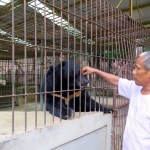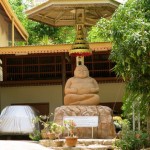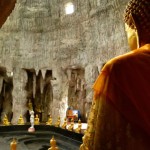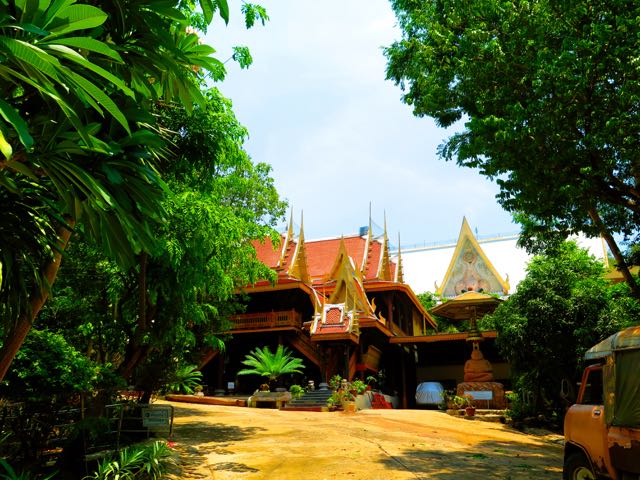
My Stomach Tells Me to Run Away from Bear Paw Mountain
The Abbot of Bear Paw Mountain is an older man, maybe 70, with black peppered gray hair stubble on his head. He’s laughing and exchanging small talk with four workers excavating a plot of land near the main temple when we approach. He seems amused when he sees us, like a principle catching sight of a student walking through his halls in a tuxedo.
Ofp bows in what I later learn is a Ka-pot, a succession of three bows where folded hands move from the forehead to the chest then to the ground to frame a prostrate face.
The Abbott asks why I want to stay here. Ofp translates. I tell him to meditate. The Abbott and Ofp exchange several phrases, and I gather that Ofp is advocating for me and softening what seems to be reluctance. Via Ofp, the Abbot tells me that I will need to shave. I tell him this is okay. He tells me I will need to wear white. I point to the all-white clothes I am already wearing. He tells me I will only be allowed to eat once a day. “Run away!” my stomach screams, but I tell it to hush. “We will only find suffering here!” my stomach pleads. I tell the Abbot this is okay. He tells me I will need to wake up at 3 AM for meditation. I nod and tell him I can accept that. This is why I’ve come, to take a break from the continuous timeline where one thing leads to the next without respite. I want to spend a week where meditation is not a part of my day, but is my day.
“You will need to speak Thai,” he tells me with a searching glance.
I tell The Abbot in Thai that, “I speak a little Thai,” which is basically all I know how to say in Thai. The Abbot seems perplexed about me. I will later learn that I am the first foreigner ever to live there. After a long pause, the Abbot indicates that it is okay, but emphasizes, “You must not talk to any women!”
I am led to an office where a nun takes my iPhone and camera for
my time there, both devices prone to compromise the mindfulness I am there to cultivate.
I am given bedding and a mesh tent to protect from nocturnal insects. I set up a corner on the first floor of a three story temple where the other novices have set up tents and sleeping mats.
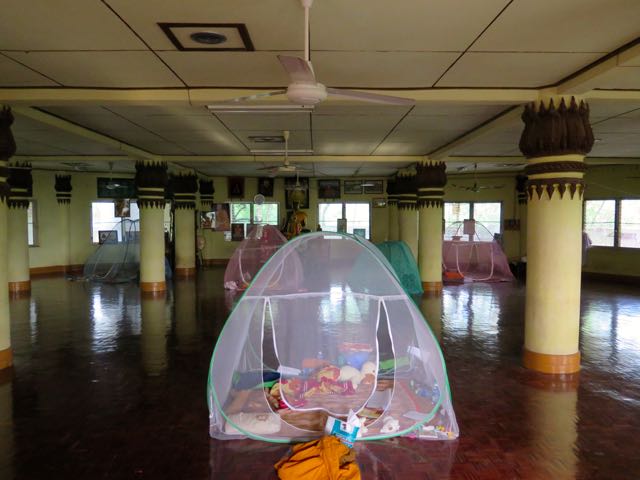
A Day To Search Unsuccessfully Mindfulness
I am then left to my own devices until the evening chants and meditation. I hike along a road that leads above the complex of temples and gutis and into the woods. Tree leaves droop from the heat and the forest is busy with animals and insects about their business. Peacocks and muntjacs frequently intersect my path and as much as I notice the beauty of these surroundings, I also notice a lack of my camera to capture it. Every time I regard something beautiful, such as deer grazing next to peacocks below yellow blossoms clinging to green leaves, the enjoyment is eclipsed by the desire to steal it from the present with the camera they have taken from me.
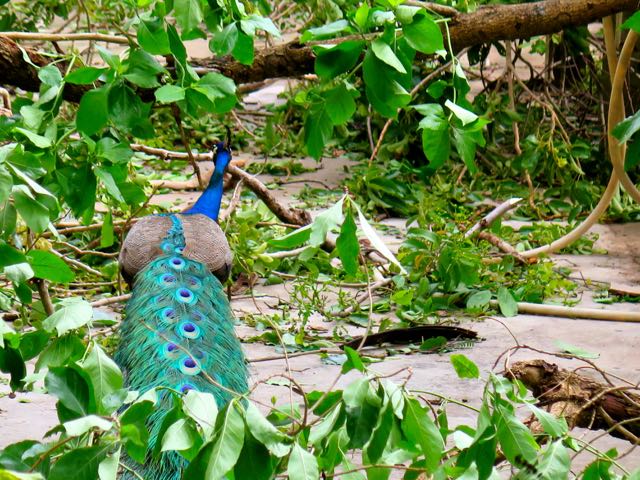
Perhaps my time here will give me some perspective in what drives this desire. We are the generation of always having a camera, and I wonder if we see less of the world as a result. Why see the world when we have it stored on a hard drive?
Recently I had to replace my 500 GB external hard drive with a 1 TB hard drive to fit every photo and video I’ve taken since 2006, when I purchased a Canon PowerShot in anticipation of a trip to Mexico. Certainly in my current profession as a travel writer, I have a legitimate need to take photos. But this need is often an impulse that exceeds necessity. Or maybe the profession stemmed from some need?
I’m here is to learn to be a photo-taker without being pushed by the desire to do so. I want to be able to sit atop Khao Sarapatdi and watch the world unfold without feeling I need to affect the present by freezing a frame of it.
After my walk in the woods, I go to the temple that rises above the room where the novices are lodged. It is a three-story circular building topped with Chinese tile roofing and covered with various motifs and symbols.
I think about how it’s easy to be adjusted and at ease when things are going well. But when plagued by constant pain, when it seems the things you love are being taken from you because of that pain, that’s when the mind becomes obsessed with thinking through repeated and unhelpful thoughts. In the last month, part of every hour has been spent recalculating the cause of my injury and fearing it is going to be a permanent fixture of preventing pain and not a temporary torture.
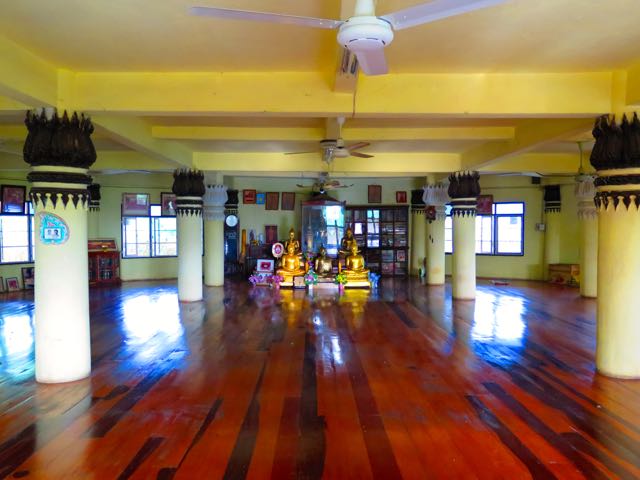
In the temple, I sit down in the lotus position on the glossy wood floor and begin to breathe. Four statues of the Buddha stare on, frozen representations of breaking the cycle of unhelpful thoughts. I uncross my legs and re-cross them the other way. My back is tingling from the pain of the journey to arrive here. Coming here was probably a poor decision, but where else should I have gone? I get up and move my cushion to one of the support columns in order force my posture to remain straight. My knees hurt, my left shoulder pains, I want to be in bed.
Focus, I command myself, thinking that such commanding of the mind is contrary to the mindset I am supposed to be fostering. Just breathe, I tell myself, but I cannot, so I leave the temple and retrieve a book from my bag. I’ll just read for a while, I decide instead. I’m upset at not being able to focus and upset that I’m upset about it. After all, I’m living now in a monastery in Asia, how dare I be upset about anything.
Taking a Meditative Break From Meditation
I read until 1 PM, do some yoga to stretch out my back, and then return to the temple to give it another go. The afternoon feels more like a practice of endurance than meditation, but I persevere till soft evening light begins to wane from the windows. I play a game. With every inhale, I search to find tension somewhere in the body. I let it go with each exhale.
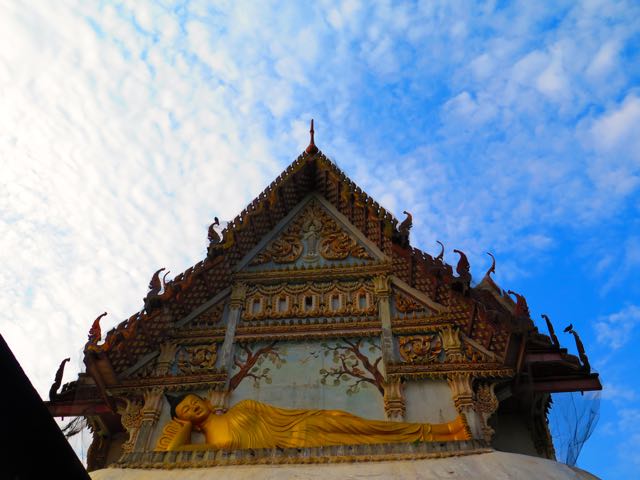
As evening approaches, the monks and novices come to chant sections of the Pali Canon. We meditate until the last bits of daylight surrender to the stars. Then everyone leaves the temple in silence to ready themselves for bed and sleep.
Meet the Other Novices
My first night is my first time interacting with the other novices. There is Som, a gray-haired man of maybe 50 who speaks to me with the handful of English he knows. I make small talk until I have exhausted my Thai vocabulary. He brings me a bottle of iced tea, “for you,” he says.
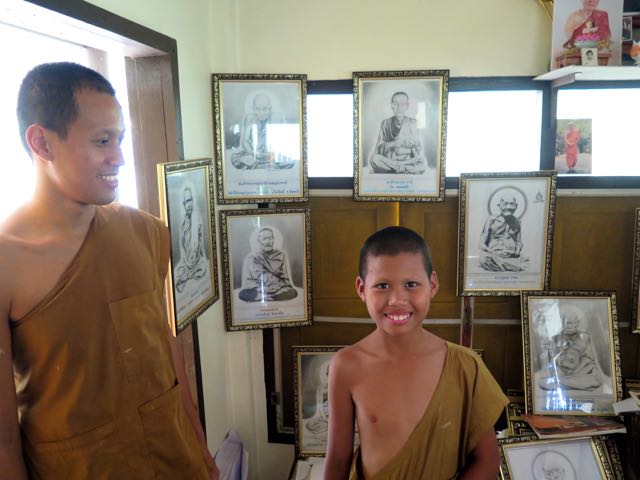
The youngest novice
Noon is the youngest novice at 11 years old and is uninhibited in his fascination with me. When I do yoga, he sits beside me to watch. When I write in my journal, he looks over my shoulder at the strange English characters.
We ready ourselves for bed, Noon brings me a soda as a gift. Everyday for the next week, he will give me
something—soda, flowers he picked, a packet of instant coffee.
Mott, who I had seen earlier, brings me a soda. As I attempted to meditate, he spent four hours slowly circling in a walking meditation on the outside balcony surrounding the circular temple. His English is good, and it is through him that I will learn most of what I’ll come to know during my time living with the monks.
I’ve made it, I think as I drift off to sleep in my mesh tent situated on the first floor of the temple. I’m here, I remind myself to fall asleep hopeful. Hopeful I’ll find healing during my time here, but more importantly, acceptance that life will go on and still be a beautiful gift even if I’m unable to play the guitar or spend much time typing in the future. I’m aware that night that in the scheme of the world, my problems are silly inconveniences, and while I know that, I want do a better job of of internalizing it and feeling it in every breath.
Read more from my series, “Being Buddhist in Thailand”


